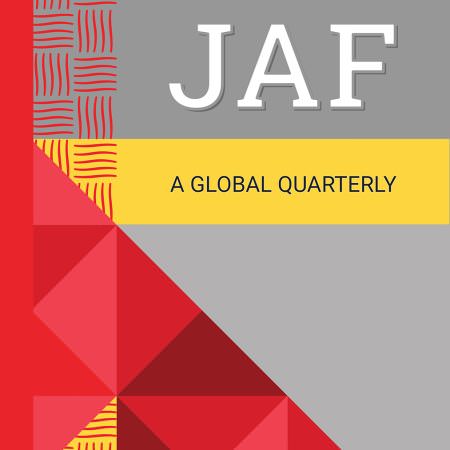New Editors Named to Lead JAF

The AFS Executive Board has selected the next editors of the JAF: A Global Quarterly (Journal of American Folklore). The journal will be lead by an editorial collective made up of Sarah Bryan (Association for Cultural Equity), Norma Cantú (Trinity University, TX), Coppélie Cocq (Umeå University, Sweden), Tim Frandy (University of British Columbia), Lisa Gabbert (Utah State University), Shelley Ingram (University of Louisiana at Lafayette), and Senior Managing Editor Lorraine Walsh Cashman. The transition will begin this fall under the leadership of current Editor-in-Chief Lisa Gilman, with the collective assuming leadership January 1, 2025.
“The conventional structure of an editor-in-chief and student editorial assistants based at a single university has prevented many talented colleagues from participating in JAF leadership,” observed AFS Publications Committee Chair Danille Christensen. “Public-sector folklorists, historically marginalized scholars with heavy service loads, and faculty at non-R1 institutions may not be able to leverage the time, funding, and personnel that editing a flagship journal requires. These days, research-intensive universities are also less poised to extend this kind of support. So this editorial collective will disperse labor and combine physical resources—and it will also bring together diverse content expertise and broad intellectual networks. We’re grateful for the creative energy of the new team and look forward to seeing them build on the excellent foundations laid by the current George Mason University editors and their predecessors.”
The members of the collective envision continuing Gilman’s work, which has concentrated on the diversification and decolonization of the field and in the strategic elevation of diverse voices and scholarly perspectives who advocate for greater equity and social justice. They write, “We envision this collective model as an additional step in diversifying and decolonizing the journal as it promotes inclusion and equity by allowing for broader participation in both the editorship and the journal as a forum for dialogue in our field. Issues that the collective will address include the role of generative AI in the scholarly process. We envision spending significant time the first year deciding what the role of AI is by engaging with the Scholarly Publications committee, the AFS Executive Board, and the emerging policies of other major journals and professional societies about this issue. Another issue we will address is the role of the journal within the greater ecology of scholarly folklore communication. Social media is central to global communication and currently the journal does not have a large social media presence. In line with our vision to reach out and include a diverse readership, it is essential to identify relevant digital channels and forms of communication to expand the journal’s impact and reach.”
The editorial collective will begin acquiring work in 2025, with Gabbert taking the first turn as the collective’s chair. Their first issue will appear in Winter 2026. The new editors are in conversation with the outgoing editorial team, including Editor-in-Chief Lisa Gilman, Associate Editors Benjamin Gatling, Debra Lattanzi Shutika, and Lijun Zhang, and Editorial Assistant Emma Bussard. AFS will issue an announcement to the membership once the new editors are prepared to receive and evaluate submissions.
As the flagship publication of the Society, published quarterly since the Society’s founding in 1888, JAF engages academic and public folklore from anywhere in the world through a wide range of materials, including blind peer reviewed scholarly articles, perspective pieces, featured and reviewed projects, and book reviews that engage with the broad field of folklore across academic, public, and applied works. JAF invites contributions that critically engage issues associated with race, ethnicity, gender, sexuality, class, ability, religion, and citizenship.
AFS President Amy Skillman praised the new collective. “The Executive Board found the idea of a collective exciting and innovative. And this particular collective is solid, reputable, and highly capable. This model opens new pathways to potentially benefit AFS in the long run. The board is also happy to see this diverse, multi-institutional collective put serious attention towards the challenges and opportunities of generative AI. This is a highly qualified group with a strong vision to continue the work of the journal, which Editor-in-Chief Lisa Gilman has expanded so well over her tenure.”
Please join the Executive Board in thanking these colleagues for their willingness to serve the Society and the field by taking on this major scholarly communications leadership role.
We sometimes make mistakes, and we are happy to correct any errors that you may come across on our site. If you find an error, please let us know using the “submit a correction” link.